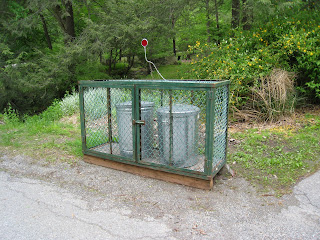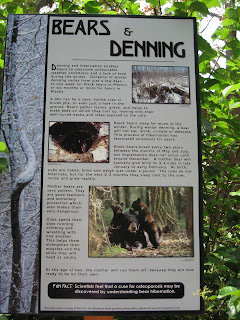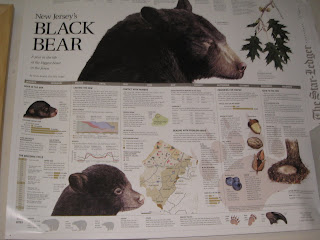 Some of what makes living in Kinnelon, NJ so magical has to do with the animals we cohabitate with. Take the largest of these critters: the New Jersey Black Bear - actually the American Black Bear. Did you know that not only has it been seen in all New Jersey counties, but it also ranges throughout most of North America?
Some of what makes living in Kinnelon, NJ so magical has to do with the animals we cohabitate with. Take the largest of these critters: the New Jersey Black Bear - actually the American Black Bear. Did you know that not only has it been seen in all New Jersey counties, but it also ranges throughout most of North America?Since moving into this area in 2004, we have had many opportunities to observe and admire, but also respect, these magnificent animals. After all, they are beautiful, but also big, bigger than me and bigger than my daughter.
 Best then to try to understand this animal, how to minimize negative encounters and how to behave in case of encounters.
Best then to try to understand this animal, how to minimize negative encounters and how to behave in case of encounters.If you get the opportunity, do attend the session that the New Jersey Division of Fish and Wildlife offers every other year or so at the Kinnelon Borough Hall. I missed the most recent one, but my daughter and I attended the previous session and learned from it.
Because, particularly at certain times of the year - early Spring through late Summer - our New Jersey Black Bears are busy. Eating, foraging, wandering... They love skunk cabbage so be on the lookout when you hike by wetlands and bogs.
Black Bears are curious and quite agile. We have observed from inside our house a momma and two cubs climbing over a cyclone fence, to peer into our neighbor's window, and then go off toward another neighbor.
We once discovered our very heavy BBQ pulled away from the house - because a very large animal had smelled the grease pan we had forgotten to empty. Bears' sense of smell is acute.
And, we've noticed them religiously visiting trash dumpsters and trash cans, to drag off into the woods any tempting loot. I'm sure you've seen the telltale trails of debris.
 Given that we truly live in bear territory, here are a few of the bear facts that the NJ Division of Fish & Wildlife offer on the "Know The Bear Facts" website.
Given that we truly live in bear territory, here are a few of the bear facts that the NJ Division of Fish & Wildlife offer on the "Know The Bear Facts" website.First, use common sense. These are WILD animals, not cute, cuddly critters. So, don't approach them and don't try to feed them!
When you are outdoors, be loud. If it's getting dark and I'm alone getting the mail from my mailbox, I sing badly and loudly.
If bears are close by, "make the bear aware of your presence by speaking in an assertive voice, singing, clapping your hands, or making other noises."
"Make sure the bear has an escape route."
"If a bear enters your home, provide it with an escape route by propping all doors open."
 As it relates to your own home:
As it relates to your own home:+ Close your garage doors.
+ At night, close your ground level windows. I assure you that a screen will not keep a curious and agile critter [if not bear, then think raccoon] out of your house.
+ Protect your garbage cans. Keep inside your garage the smelly-bear-desirable trash and put it out for collection at the last possible moment. Or, consider these garbage cages I discovered around Sterling Forest properties.
+ Forget about bird feeders.
[BTW, be sure to close car windows at night, particularly if there's any kind of food or food wrappers inside. Otherwise, you might be surprised to find that visitors have come by.... Raccoon or otherwise!]
"Avoid direct eye contact and never run from a bear. Instead, slowly back away."
 "To scare the bear away, make loud noises by yelling, banging pots and pans or using an airhorn. Make yourself look as big as possible by waving your arms. If you are with someone else, stand close together with your arms raised above your head."
"To scare the bear away, make loud noises by yelling, banging pots and pans or using an airhorn. Make yourself look as big as possible by waving your arms. If you are with someone else, stand close together with your arms raised above your head.""The bear may utter a series of huffs, make popping jaw sounds by snapping its jaws and swat the ground. These are warning signs that you are too close. Slowly back away, avoid direct eye contact and do not run."
"If a bear stands on its hind legs or moves closer, it may be trying to get a better view or detect scents in the air. It is usually not a threatening behavior."
"Black bears will sometimes "bluff charge" when cornered, threatened or attempting to steal food. Stand your ground, avoid direct eye contact, then slowly back away and do not run."
"If the bear does not leave, move to a secure area."
 During the NJDEP presentation, we were told never to play dead around the New Jersey Black Bear. Make noise, and lots of it, instead.
During the NJDEP presentation, we were told never to play dead around the New Jersey Black Bear. Make noise, and lots of it, instead.And, don't leave your children or small pets outside unsupervised.
Read through the Bear Facts website, check out Black Bear Safety Techniques, don't ever feed the bears - it's illegal in New Jersey! - and educate yourself. There's real magic to having bears around -- at a safe distance.
And, as long as they don't associate you or your home with food, they will remain at a safe distance. Hence the law to not feed the bears.
To learn more about the New Jersey Black Bear, consider visiting Pyramid Mountain Park and speaking with the rangers. The Visitors Station also has nice displays [e.g., see the Black Bear poster image above].
Another resource is the Turtle Back Zoo from which the other four poster images above come from. If you go there, you can meet Jelly and Jam, two New Jersey Black Bears.
Now, there's plenty of controversy surrounding Black Bears in New Jersey. Suburban Trends reported on Serious bear incidents more than double in 2008 [2/17/2009]. In researching this Kinnelon Critter file, I discovered the NJ Bear Hunt Blog, about the need for dealing with bear overpopulation issues. The Bear Education and Resource Group vehemently opposes a hunt solution recommending instead aversive bear conditioning [I'm thinking that someone may be receiving a supersoaker water gun for his birthday...].
What other bear tips do you recommend?

Technorati Tags: NJ Black Bear American Black Bear New Jersey Black Bear bear facts bear tips bear hunt Kinnelon critter file Del.icio.us Tags: NJ Black Bear American Black Bear New Jersey Black Bear bear facts bear tips bear hunt Kinnelon critter file
No comments:
Post a Comment